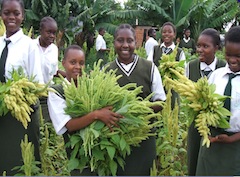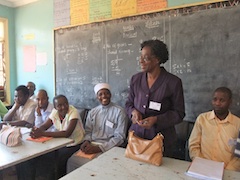ARC launches a faith-based teacher's toolkit in Kenya
July 16, 2013:
The religions play an enormous role in schools worldwide, particularly in Africa where 60-80% of schools are estimated to have been established, run or funded by faith groups. Tomorrow, in Nairobi, Kenya, ARC will launch a teacher's toolkit that integrates faith values about caring for creation with teaching on the environment in primary schools.
This is an exciting moment for the ARC team which has spent the last two years working on the toolkit in partnership with the Kenyan Organization for Environmental Education. The ground-breaking toolkit has been endorsed by Kenya’s major Christian, Muslim and Hindu groups as well as the country’s Ministry of Education and National Environment Management Authority.
Its foreword has been written by the Permanent Secretary of the Ministry of Education, Professor George Godia, who said the Faith-based Education for Sustainable Development Toolkit “could not have come at a better time”, adding: “I salute the Kenya Organization for Environmental Education and the Alliance of Religions and Conservation for this joint and timely initiative.”
Peter Nyagrowa, Secretary General of the Christian Churches’ Education Association, said the faith-based ESD toolkit “carries hope for Africa. This material will go a long way in improving the quality of education as well moulding the moral and spiritual aspects of our school-going youth into responsible and God-fearing citizens”.
 |
 |
 |
Pupils with their harvest at Goibei High School, Western Kenya - a leading Eco-School |
The toolkit has been developed for faith-sponsored primary schools in Kenya, but the aim is to make it available for other countries in sub-Saharan Africa to adapt to their own needs.
To that end, in September this year ARC and KOEE will hold a meeting in Dar-es-Salaam in partnership with The Jane Goodall Institute to discuss implementation of the toolkit in Tanzania. It will be attended by educationalists and faith leaders from Uganda – the next country where we will take the toolkit.
About the toolkitThe toolkit takes an Education for Sustainable Development (ESD) approach and uses an Eco-School stategy as a way of teaching practical skills in a fun, engaging and experiential way. ESD is a UNESCO strategy which seeks to develop knowledge and skills that will enhance people’s quality of life now without damaging the environment for future generations, while Eco-Schools is a worldwide movement focussing on action-oriented learning.
 |
| The toolkit “carries hope for Africa. This material will go a long way in improving the quality of education as well moulding the moral and spiritual aspects of our school-going youth" - Peter Nyagrowa, Christian Churches’ Education Association |
|
 |
 |
Seven of Kenya’s key faith groups have been involved in the development of the toolkit: the Anglican Church of Kenya, the Catholic Church in Kenya, the Methodist Church in Kenya, the Presbyterian Church of East Africa, the Seventh Day Adventists, the Supreme Council of Kenya Muslims (SUPKEM) and the Hindu Council of Kenya. It was our faith partners who insisted that only one toolkit should be produced rather than separate ones for the three faiths.
In addition, 10 schools covering all regions of Kenya agreed to act as model eco schools, implementing micro projects ranging from improving a school’s hand-washing facilities to establishing school gardens to grow food or building latrines. In total 35 schools were engaged during the pilot phase of the faith-based ESD initiative.
The toolkit looks at seven environmental themes in detail – water, health (sanitation and hygiene), agriculture, waste, energy, biodiversity and climate change. Within each theme specific faith teachings have been highlighted as well as information and classroom activities that link into the Kenyan curriculum.
KOEE executive director Dr Dorcas Otieno said: “This toolkit was developed in such a way that the teaching and learning is done in the traditional subjects offered in our school curriculum.”
The toolkit also includes sections on good practice teaching methods, such as drama, games or role play, as well as how to become an eco-school, set up small micro projects and school case studies.
 |
 |
 |
One of the teachers' workshops to develop the toolkit |
What people are saying about the toolkit:Rev. Fr. Vincent Wambugu, General Secretary of Kenya Conference of Catholic Bishops, said the toolkit is “a great tool to use to use in moulding our youth to become champions of the environment... At the Catholic Church, we are convinced that our children, who are the leaders of tomorrow, need to be adequately equipped to face tomorrow’s challenges. If we want our children to live in a clean, healthy and secure environment, we need to prepare them for the future they will inherit.”
Abdalla M. Kamwana, Programme Manager of the Supreme Council of Kenya Muslims: “It is a comprehensive and broad-based piece of work that will ensure pupils are nurtured with a heart for the environment in their formative years for the benefit of all humanity, both present and future.”
S.B. Varma, National Chairman, Hindu Council Of Kenya: “This publication is an important and integral part of imparting faith-based values that enrich ESD, while providing the motivation for environmental conservation.”
Mounkaila Goumandakoye, Director and Regional Representative, UNEP Regional Office for Africa: "The faith-based approach to Education for Sustainable Development is of critical importance in promoting responsible behaviour to live sustainably for human progress."
Professor Geoffrey Wahungu, Director General of Kenya’s National Environment Management Authority: “The role of faith in shaping our value system cannot be over-emphasised. Entrenchment of religious wisdom into ESD is therefore an innovation that we all ought to be proud of.”
More informationYou can download a copy of the toolkit here.
You can find more information on this initiative on ARC's education and water pages.
The development of the toolkit is part of ARC's work with 27 faith groups in sub-Saharan Africa. See the Africa project pages for more details.
|

